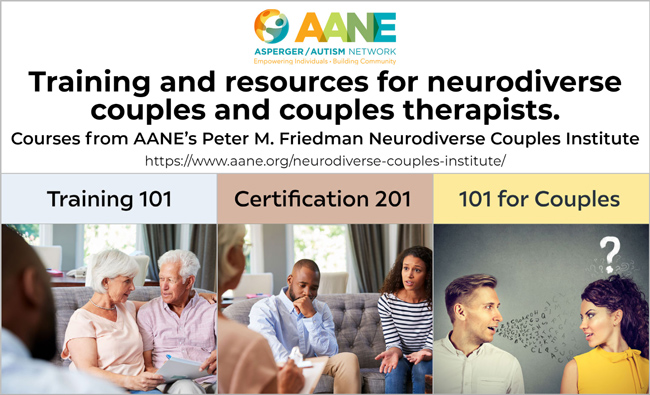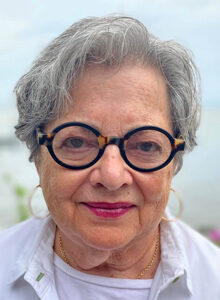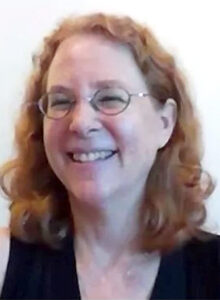Many couples come to the realization they are in a neurodiverse relationship decades into their relationship, after listening to a podcast, reading a book, or watching a movie that includes an autistic character. But recognizing neurodiversity is just the beginning… Then what? How does neurodiversity impact an intimate relationship? What is the effect on the couple together and on each partner separately? Comments from couples often include remarks such as, “we speak different languages,” “we feel disconnected,” and “we want to develop emotional understanding.”

AANE’s Services for Neurodiverse Couples
Neurodiverse couples often have difficulty finding therapists trained in neurodiversity or they may struggle with therapists who don’t understand their complex issues. Our research has shown that working with untrained therapists can create even more problems for them. To support the need for trained therapists, AANE created the Peter M. Friedman Neurodiverse Couples Institute in 2017.
The mission of AANE’s Peter M. Friedman Neurodiverse Couples Institute is to increase awareness, support, and resources for neurodiverse couples – in which one or both members are autistic – by providing specialized training for therapists to recognize, understand, and treat this unique population.
The Institute began with two courses for professionals: Training 101 and a follow-on course called Certification 201. Since 2017, over 176 couples therapists, and coaches have been trained and can be found on the AANE website’s map. In 2021, the Institute’s offerings expanded to include an online, self-paced course for neurodiverse couples: Couples 101.
TRAINING 101: Fundamentals of Working with Neurodiverse Couples in Therapy teaches therapists how to recognize, understand, and effectively treat neurodiverse couples in therapy. This is a 10-hour, self-paced online training.
Developed by Grace Myhill, MSW, the course includes in-depth lectures from Grace and other experts in the field, including insights and observations from a panel of therapists who work with neurodiverse couples. In addition to hearing from professionals, participants will get an intimate peek into the lives of 10 neurodiverse couples as they share their experiences and the complexities of being in a neurodiverse relationship.
CERTIFICATION 201: Case Presentations and Advanced Topics in Neurodiverse Couples Therapy is for those who want to hone their skills and knowledge about working with neurodiverse couples in therapy. Classes meet 8 times for 90 minutes by video conference.
With a small group of 5 – 8 fellow clinicians, participants hear short lectures by Grace Myhill, MSW, on topics such as telling a couple they are neurodiverse, dealing with episodes of dysregulation, and discussing physical intimacy. Participants also present and discuss their own clients and have a Q&A session with a neurodiverse couple and a specialist in the field of neurodiverse couples therapy.
101 for Couples: Fundamentals of Recognizing and Understanding Neurodiversity
For neurodiverse couples, improving connection requires an awareness of each partner’s neurological profile and an understanding of the role their neurological differences have on the relationship.
The three-hour online course is self-paced and includes four lectures by experts in the field of neurodiverse couples therapy and intimate interviews with nine neurodiverse couples on recognizing and understanding neurodiversity. There are also recommended resources and four downloadable PDFs, which describe common autistic characteristics and their impact on each partner and on their relationship dynamics, with strategies that worked for the couples.
The couples that you meet in the course love one another and work hard to understand and accept their differences. You will learn about the unique strengths and challenges these couples commonly face.
Experts in neurodiversity Grace Myhill, MSW, and Jamie Freed, MSW, cover areas of importance for couples to understand such as theory of mind, weak central coherence, and sensory sensitivity. Theory of mind is recognizing that others may view something very differently than you do and understanding their perspective. Weak central coherence is when an individual may be detail-oriented but has trouble seeing the overall picture. For example, those with weak central coherence visualize only what is shown on a partially rolled up map, such as a portion of a river or a road, but can’t visualize the whole map in their mind until it is unfurled. Another area discussed in the course is sensory sensitivity. This refers to the impact of touch, sound, smell, body awareness, and other senses that people might experience differently.
AANE also offers Couples Coaching. Intimate relationships can be hard, but they are especially challenging when partners have different perspectives, communication techniques, approaches, and skill sets. In Neurodiverse Couples Coaching sessions, which can occur individually or together with the spouse/partner, discussing their unique relationship is at the center. Neurodiverse Couples Coaching includes learning to problem solve, develop coping strategies, and build skills to improve their relationship. Topics that neurodiverse couples often seek help with include: communication, social or general anxiety, executive function challenges, rigidity, obsessions or hoarding, sensory issues, lack of emotional reciprocity, or physical intimacy.
AANE offers open groups for the neurotypical spouses in neurodiverse relationships. They will gain a sense of community and find others navigating similar situations, along with learning new words and phrases to explain some of what they are experiencing and a host of resources to assist them.
AANE has much to offer couples and spouse/partners as well as families and individuals including free resource and referral calls with clinicians, online discussion forums, conferences, webinars, support groups, and coaching, not to mention the many first-person accounts on the website. Check out www.aane.org and subscribe to AANE’s emails and newsletter to stay informed.
Pat Schissel, LMSW, is a social worker and New York Director of the Asperger /Autism Network, AANE. She taught at the graduate level at CW Post and Adelphi Universities and was given an honorary doctorate at Adelphi for her contributions to the field of autism. Pat facilitates a number of groups for AANE including a monthly Spouse/Partner Group. She is a certified coach through her work at the Peter M. Friedman Neurodiverse Couples Institute at AANE and is an Advisory Team member of the Institute. Pat is a founding member of the Editorial Board of Autism Spectrum News. Pat can be reached at AANE at pat.schissel@aane.org or at her private practice for couples or neurotypical spouse/partners at patschissel.msw@gmail.com.
Grace Myhill, MSW, is a pioneer and leader in the field of neurodiverse couples therapy. Since 2004, she has worked with over one thousand neurodiverse couples together or separately. She has developed numerous skill-building tools and lessons to enhance communication and emotional connection. Grace offers a variety of online groups for the many facets of this unique population: for neurodiverse couples together, for partners with an Asperger’s/autism profile, for neurotypical partners who are currently in a neurodiverse relationship, and for neurotypical partners who are separated or divorced from an ex-partner with an Asperger’s/autism profile. She currently holds the titles of Director of Couples and Partner’s Services and Director of the Peter M. Friedman Neurodiverse Couples Institute at AANE, where Grace trains professional clinicians to work effectively with neurodiverse couples through online courses she developed for AANE. She has written several articles and is a frequent guest on podcasts. For more information visit www.gracemyhill.com.
For therapists or partners in a neurodiverse couple who would like to learn more about AANE’s online trainings and other resources, contact Grace Myhill at grace.myhill@aane.org.






